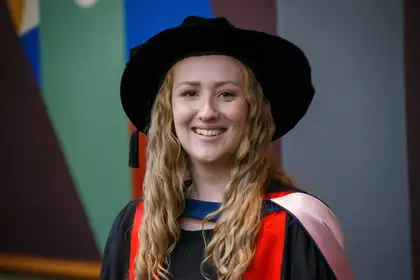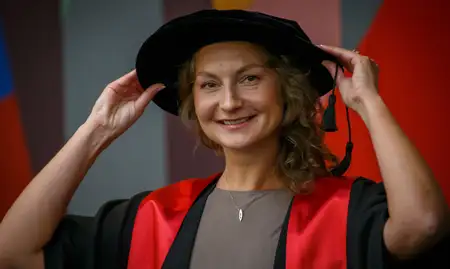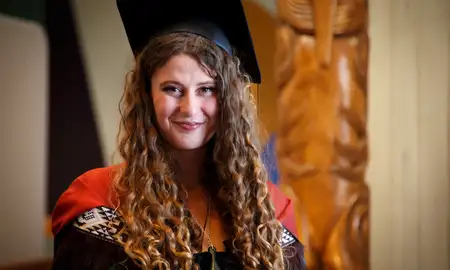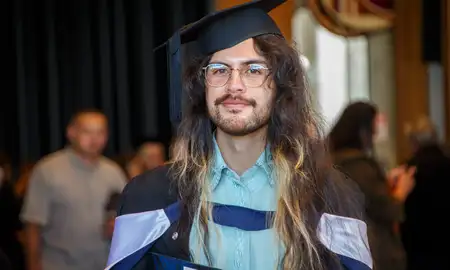
Dr Caitlin Helme.
Doctor of Clinical Psychology graduate Caitlin Helme’s experience as a crisis worker with the Sexual Abuse HELP Foundation in Wellington highlighted barriers that disabled people face when seeking support for sexual violence. It was this knowledge that motivated the direction of her research.
“People who experience social marginalisation are disproportionately sexually harmed, and in forms that differ from the dominant population. However, it is often their voices left out of research. This devalues their lived experience and makes it hard to improve their situation.”
Completing her doctorate during the COVID-19 outbreak provided a uniquely challenging experience for Dr Helme, but also presented a new lens through which to explore the scope of her thesis.
“My research initially aspired to explore what support was available to survivors of sexual violence who experience intersecting layers of discrimination, including ableism, sexism, racism and heterosexism. Things took a turn with the arrival of COVID-19. I began to hear stories about the complexities COVID-19 brought to the sexual violence space. People who were socially marginalised pre-pandemic were also some of the most drastically impacted by it. What was already hard only got harder.”
Through eight, teller-focused interviews, Dr Helme spoke with seven respondents who shared their stories within the pre and peri-COVID-19 landscape. The respondents were both service providers and survivors of sexual violence with lived experience of marginalisation. Through the telling of their stories, embedded social inequities became apparent which intersected to further oppress survivors, creating barriers that prevented appropriate support.
“My respondents spoke so passionately about the issues they faced as survivors and how deep-rooted some of the problems are, such as the ongoing impacts of colonisation. The providers spoke of working in a sector so overwhelmed they were burning out, with some having to leave the profession. Radical change is necessary to address these social inequities to promote an equal response to sexual violence, and the only way those changes can be made is by listening to those on the ground. We need to do much better to support survivors with diverse identities in Aotearoa.”
During Dr Helme’s work with respondents, she found over half were both service providers and survivors themselves.
“I was recruiting experts who I thought were two distinct groups, but this showed a real reflection of the appallingly high rates of sexual violence in Aotearoa, especially for people who experience marginalisation. It also showed how people with lived experience are often drawn to help others.”
From a young age, Dr Helme found herself drawn to the helping professions. She first thought this meant becoming a doctor, but after being exposed to her mother’s work as an occupational therapist, she became fascinated by the workings of the brain.
Dr Helme began studying psychology at the University of Otago but fell unwell not long after. She was diagnosed with rheumatoid arthritis, Crohn’s disease and chronic fatigue which presented a range of challenges, including a knock to her own mental wellbeing. The many barriers Dr Helme had to overcome ignited her passion for disability advocacy and working towards equity for all.
She went on to complete a Bachelor of Arts with Honours at Otago University, followed by a Postgraduate Certificate of Arts at Te Kunenga ki Pūrehuroa Massey University, before being accepted into the clinical psychology programme at the Pukeahu campus in Wellington.
The 27-year-old says what she found unique about the Doctor of Clinical Psychology programme was the integration of practical learning.
“Having several placements that I absolutely adored and then being placed in an internship which aligned with my passions reminded me why I’m so excited to be a clinical psychologist. Massey and my workplace worked incredibly hard to meet my accessibility needs, such as enabling me to complete my internship part time, which I see as a brilliant step towards equity. I strongly believe we need psychologists who have lived experience of mental and physical health challenges, but without adequate support to do the training, this is going to remain a significant gap in the sector.”
In 2020, Dr Helme moved back to her hometown of Ngāmotu New Plymouth to start her clinical psychology internship with Te Whatu Ora Taranaki. She has now accepted a permanent role there which sees her working in the health psychology service, predominantly helping people with persistent pain and/or diabetes.
“Given what we know about the high rates of sexual violence towards disabled people, it is not uncommon for people to disclose experiences of sexual harm to me in my role, which means I can help them find appropriate support. I really believe the knowledge I gained from my research has helped me become a better therapist for my clients.”
Dr Helme says completing nine years of study as a disabled person is no easy feat and she’s been lucky to have a lot of support throughout her journey.
“I would never have come this far without my supervisors Professor Mandy Morgan and Associate Professor Leigh Coombes, and the many other amazing tutors, friends and family I’ve been blessed to have along the way. I want to acknowledge the survivors who spoke with me about some of the most difficult parts of their lives. I feel incredibly privileged to be entrusted with those narratives. Likewise, I am grateful to the service providers who found time to speak with me despite being essential services and stretched to their limits during the pandemic.”
Dr Helme is also grateful to her partner Cameron who she met in her first year at Otago University and has been there for all the ups and downs. They’ve recently gotten engaged, so are being kept busy with their two dogs and a wedding coming up next year.
Looking back on her experience, Dr Helme says her advice for PhD students is to not lose themselves in the process.
“When you take on something as huge as a doctorate, it’s easy for it to become all-consuming. Ringfence time for your wellbeing, keep in touch with friends even when you’re feeling stressed – especially then! – and don’t be afraid to lean on those around you.”
Related news
Smoosh – a flatpack shoe designed for a digital nomad lifestyle
Dr Magdalena Karasinska’s nomadic experience served as a valuable starting point for her creative and practice-led research PhD project called ‘Smoosh.’

Sharing the mana through connecting passions
Talia Brewer, Te Ātiawa ki Whakarongotai, Ngāti Raukawa ki te Tonga and Ngāti Toa Rangatira, Ngāti Ruanui, Ngā Ruahine, is graduating not only with a Master of Applied Social Work but with a reinforced sense of self and purpose.

Finding drive in a new perspective
With the pandemic delaying his plans to travel overseas, Matt Tini, Waikato, Ngāti Tiipa, Ngāti Rākaipaaka, Ngāti Kahungunu, decided to broaden his horizons by continuing his academic journey.
